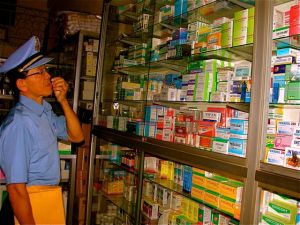A Day in the Life of a Pailin Drug Inspector
CONTAINMENT’s Moeun Chhean Nariddh follows Justice Police Officer Nuth Tith on his rounds in the Pailin market in North-West Cambodia.

Justice Police Officer Nuth Tith inspecting a Pailin pharmacy's display cabinet. Pix by WHO/Moeun Chhean Nariddh
It’s almost noon now in Cambodia’s Pailin province on the northwestern border with Thailand. Nuth Tith, a middle-aged health official, quickly changes his clothes and wears a new police uniform.
With a light blue shirt and dark blue trousers together with a sky blue cap, Nuth Tith looks no different from other police officers.
The only difference is that the sign on his shirt is a medical symbol instead of the normal Singha, or King of Lions, emblem used by other national police officers. Another thing is that he does not have a revolver in his belt and neither does he carry handcuffs.
Yet, he is not a normal policeman.
Trained as one of the five justice police officers in Pailin, Nuth Tith’s duty is to inspect pharmacies and drug stores to make sure that no counterfeit or substandard malaria drugs are on sale.
He is now ready to carry out his tasks.
After a ten-minute ride from the provincial hospital, he hops out of the car and rushes to a line of drug stores at a small market near Pailin.
“Do you have any malaria drugs left?” he asks Phat Sambo, a 28-year old drug seller at the front row.
“No!” she replies, laughing.
He searches the drug cabinet but finds no malaria drugs on sale.
“Now, put these flyers on the wall and don’t put any other pictures,” he advices and hands out a few anti-malaria drug flyers to Sambo.
Nuth Tith says the justice police officers would inspect the pharmacies and drug stores every three months as part of the efforts to stop the sale of malaria drugs and other fake and substandard medicines.
He explains that if the justice police find any counterfeit drugs, they will confiscate them. But he adds that a justice police officer has no power to arrest anyone found in possession of malaria drugs or other counterfeit and substandard medicines.
The drug inspector says that in the malaria containment project, funded by the Bill & Melinda Gates Foundation, drug sellers from Pailin and other remote areas had been invited to a workshop where they were trained by officers from the Ministry of Health and the National Centre for Parasitology, Entomology and Malaria Control or CNM. Tith says they received lectures on the dangers of artemisinin-resistant falciparum malaria spreading globally and were encouraged to help eradicate malaria altogether.
“I think it’s good to have justice police to make sure that no fake drugs that damage people’s health [are on sale],” says Phat Sambo.
Now, the drug inspector has got back into the car and moved to the pharmacies in Pailin market. He stops by a pharmacy run by 36-year-old Sor Pov, who’s been selling medicines for the past eight years.
When asked if she has received any patients who have come to buy malaria medicines, she replies that only about one in every 100 people have asked for malaria drugs at her store.
Duch Vanda, a 43-year-old vendor who sells medicines at a pharmacy next to Sor Pov’s, agrees that the number of people seeking malaria medicines has sharply declined.
“Now, almost nobody asks for malaria drugs,” he claims.
As instructed by the justice police, both Sor Pov and Duch Vanda say they would refer any malaria patients to get free treatment at the health centers around Pailin, if any customer asks to buy malaria medicines.
Sambo says the justice police officers have visited her store five times now since she started selling drugs two years ago.
“I think the anti-malaria campaign has been very successful, because there are no more malaria patients,” Sor Pov points out.
Drug inspector Nuth Tith then continues to the last pharmacy in the same row at Pailin market. But, he still cannot find any malaria or other fake drugs either.
Tith says that since he started his new drug inspection job three years ago, he has found less and less malaria drugs in the 25 pharmacies and drug stores he constantly inspects in Pailin.
After visiting the last pharmacy, Nuth Tith returns to the provincial hospital with a smile, proving that his work has been a success.
“[In the past] there were a lot of malaria drugs on sale,” he recalls. “Now, we hardly find any malaria medicines.”
Hi,
This is a great website, and a great story. I’d like to ask you to explain why the anti-malarials at the pharmacies are confiscated. Are they always fake? Is there no private source of anti-malarial drugs in Cambodia?
Best regards,
Sarah
December 8, 2010 at 6:19 am
Dear Sarah,
The Drug Inspectors confiscate fake and counterfeit drugs (based on observable features of the packaging, or chemical testing of the product); they also confiscate single-drug treatments (so-called monotherapies) because the only approved treatments are two-drug combinations. This still leaves a large number of outlets selling these two-drug combinations, which comprised over 56% of all treatments sold or distributed, according to the ACT Watch Outlet Survey of 2009.
That said, in Pailin there is virtually no demand for antimalarials this year, because malaria incidence is so low, and greatly improved diagnosis and treatment from health centers and Village Malaria Workers has really knocked the private sale of antimalarials.
Kind regards,
Dr Steven Bjorge,
Malaria Team Leader
WHO Cambodia
malariacontainment
December 9, 2010 at 2:01 pm